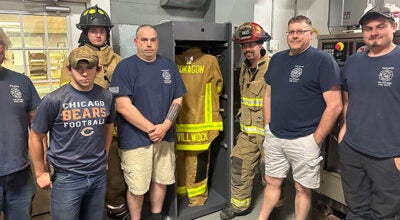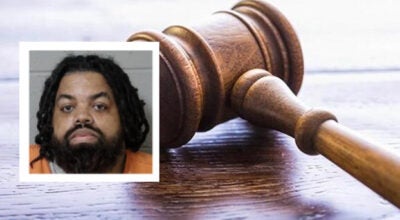Sobriety Court has first grad
Published 10:00 pm Wednesday, February 1, 2012

Sobriety Court coordinator Alyssia Moord, Roger Essex of Dowagiac, who was 484 days sober Jan. 26, and Fourth District Judge Stacey Rentfrow, who took the bench Jan. 1, 2009, after Paul Deats retired, mark the program's first graduation.
Sobriety Court Jan. 13 graduated its first person to complete the 15-month, four-phase program, Roger Essex of Dowagiac, who turned his community service assignment into temporary employment with the city.
In the spirit of it takes a village, Dowagiac Lions Club helped Essex with glasses; the Housing Commission found him a place to stay.
“The program really works if you want it to,” Essex said. “It was hard. I had to hitchhike to make meetings. I’ve been to 700. I’m on a journey now to help out society in any way I can. I might not be able to give money, but I want to give back for what they gave me. I have brand-new friends and moved on. I have given up that life forever. I’m proud of everyone being proud of me.”
Cass County Sobriety Court, implemented in October 2010 after a year-long planning process that began shortly after Fourth District Judge Stacey Rentfrow took the bench, was approved in October 2011 for $350,000 in federal Bureau of Justice Assistance funds over three years.
Rentfrow said the funds will enable a drug court to process felonies as well as misdemeanors. The grant permits 10; there are soon to be six.
Sobriety Court, a movement with a 20-year track record nationally, is voluntary because those sentenced to that option surrender rights and subject themselves to random tests and home searches.
As Rentfrow told Dowagiac Rotary Club Thursday at Elks Lodge 889 as the guest of Sheriff Joe Underwood, Sobriety Court constitutes a “problem-solving court. It’s an intensive supervision program with regular treatment of at least nine hours a week starting out. There are self-help meetings, recovery-related activities, weekly court hearings, we go into their homes and test them. Traditional court doesn’t have regular weekly hearings. Once I sentence someone to jail or probation, I usually don’t see them unless there is a violation.”
Sobriety Court revolves around a team approach. Team members meet before every hearing, involving prosecutors, defense attorneys, treatment representatives and case managers “who all share information at the table,” which helps red-flag developing problems.
Judge Susan Dobrich launched a Family Treatment Court several years ago.
“She was helpful mentoring me and her team mentoring our team. It works because of that combination of intensive treatment, random testing and seeing the judge regularly when you’re trying to change a person’s behavior.”
Another factor, she said, is what research shows about carrots and sticks.
“If you provide sanctions or incentives, that helps change a person’s behavior,” Rentfrow said. “Incentive can be as simple as me praising an individual and acknowledge correct behavior. We clap to acknowledge their days of sobriety, which surprises individuals coming to court. We give gift cards” for gas, fast food or breakfast because they might have lost their license and rely on others for rides and because those types of restaurants don’t serve alcohol.
Sanctions can be incurred for missing a treatment session or showing up late to court. Depending on the offense, it can lead to jail time, termination from the program, community service or even a writing assignment.
“They don’t want to read in court,” she said. “We don’t agree with people relapsing, but research shows it’s going to happen.”






